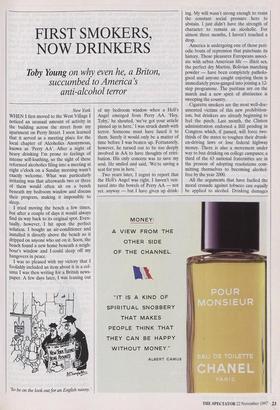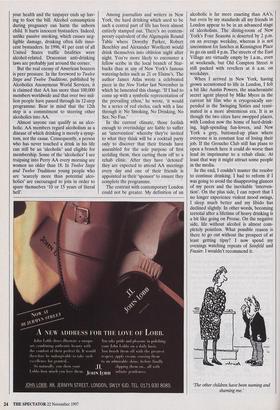FIRST SMOKERS, NOW DRINKERS
Toby Young on why even he, a Briton,
succumbed to America's anti-alcohol terror
New York WHEN I first moved to the West Village I noticed an unusual amount of activity in the building across the street from my apartment on Perry Street. I soon learned that it served as a meeting place for the local chapter of Alcoholics Anonymous, known as 'Perry AA'. After a night of heavy drinking I'm prone to feelings of intense self-loathing, so the sight of these reformed alcoholics filing into a meeting at eight o'clock on a Sunday morning wasn't exactly welcome. What was particularly irritating was that afterwards two or three of them would often sit on a bench beneath my bedroom window and discuss their progress, making it impossible to sleep.
I tried moving the bench a few times, but after a couple of days it would always find its way back to its original spot. Even- tually, however, I hit upon the perfect solution. I bought an air-conditioner and installed it directly above the bench so it dripped on anyone who sat on it. Soon, the bench found a new home beneath a neigh- bour's window and I could sleep off my hangovers in peace.
I was so pleased with my victory that I foolishly included an item about it in a col- umn I was then writing for a British news- paper. A few days later, I was leaning out `So be on the look out for an English nanny.' of my bedroom window when a Hell's Angel emerged from Perry AA. 'Hey, Toby,' he shouted, 'we've got your article pinned up in here.' I was struck dumb with terror. Someone must have faxed it to them. Surely it would only be a matter of time before I was beaten up. Fortunately, however, he turned out to be too deeply involved in AA to have thoughts of retri- bution. His only concern was to save my soul. He smiled and said, 'We're saving a seat for you in here.'
Two years later, I regret to report that the Hell's Angel was right. I haven't ven- tured into the bowels of Perry AA — not yet, anyway — but I have given up drink- ing. My will wasn't strong enough to resist the constant social pressure here to abstain. I just didn't have the strength of character to remain an alcoholic. For almost three months, I haven't touched a drop.
America is undergoing one of those peri- odic bouts of repression that punctuate its history. Those pleasures Europeans associ. ate with urban American life — illicit sex, the perfect dry Martini, Bolivian marching powder — have been completely patholo- gised and anyone caught enjoying them is immediately press-ganged into joining a 12- step programme. The puritans are on the march and a new spirit of abstinence is sweeping the country.
Cigarette smokers are the most well-doc- umented victims of this new prohibition- ism, but drinkers are already beginning to feel the pinch. Last month, the Clinton administration endorsed a Bill pending in Congress which, if passed, will force two- thirds of the states to toughen their drunk- en-driving laws or lose federal highway money. There is also a movement under way to ban drinking on college campuses; a third of the 63 national fraternities are in the process of adopting resolutions com- mitting themselves to becoming alcohol- free by the year 2000.
All the arguments that have fuelled the moral crusade against tobacco can equally be applied to alcohol. Drinking damages your health and the taxpayer ends up hav- ing to foot the bill. Alcohol consumption during pregnancy can harm the unborn child. It hurts innocent bystanders. Indeed, unlike passive smoking, which causes neg- ligible damage, drinking often kills inno- cent bystanders. In 1996, 41 per cent of all United States traffic fatalities were alcohol-related. Draconian anti-drinking laws are probably just around the corner.
But the real enemy of American boozers is peer pressure. In the foreword to Twelve Steps and Twelve Traditions, published by Alcoholics Anonymous World Services, it is claimed that AA has more than 100,000 members worldwide and that over two mil- lion people have passed through its 12-step programme. Bear in mind that the 12th step is a commitment to steering other alcoholics into AA.
Almost anyone can qualify as an alco- holic. AA members regard alcoholism as a disease of which drinking is merely a symp- tom, not the cause. Consequently, a person who has never touched a drink in his life can still be an 'alcoholic' and eligible for membership. Some of the 'alcoholics' I see traipsing into Perry AA every morning are women no older than 18. In Twelve Steps and Twelve Traditions young people who are 'scarcely more than potential alco- holics' are encouraged to join in order to spare themselves '10 or 15 years of literal hell'. Among journalists and writers in New York, the hard drinking which used to be such a central part of life has been almost entirely stamped out. There's no contem- porary equivalent of the Algonquin Round Table where Dorothy Parker, Robert Benchley and Alexander Woollcott would drink themselves into oblivion night after night. You're more likely to encounter a fellow scribe in the local branch of Star- bucks than at any of New York's famous watering-holes such as 21 or Elaine's. The author James Atlas wrote a celebrated piece in the New Yorker last November in which he lamented this change. 'If I had to come up with a symbolic representation of the prevailing ethos,' he wrote, 'it would be a series of red circles, each with a line through it: No Smoking, No Drinking, No Sex. No Fun.'
In the current climate, those foolish enough to overindulge are liable to suffer an 'intervention' whereby they're invited to what they think will be a cocktail party only to discover that their friends have assembled for the sole purpose of first scolding them, then carting them off to a rehab clinic. After they have `detoxed' they are expected to attend AA meetings every day and one of their friends is appointed as their 'sponsor' to ensure they complete the programme.
The contrast with contemporary London could not be greater. My definition of an alcoholic is far more exacting than AA's, but even by my standards all my friends in London appear to be in an advanced stage of alcoholism. The dining-room of New York's Four Seasons is deserted by 2 p.m. on an average weekday, whereas it is not uncommon for lunches at Kensington Place to go on until 4 p.m. The streets of the East Village are virtually empty by 1.a.m., even at weekends, but Old Compton Street is still packed with revellers at 6 a.m. on weekdays.
When I arrived in New York, having grown accustomed to life in London, I felt a bit like Austin Powers, the anachronistic secret agent played by Mike Myers in the current hit film who is cryogenically sus- pended in the Swinging Sixties and reani- mated in a more abstemious era. It is as though the two cities have swopped places, with London now the home of hard-drink- ing, high-spending fun-lovers, and New York a grey, buttoned-up place where everyone is in constant fear of losing their job. If the Grouch() Club still has plans to open a branch here it could do worse than lend its imprimatur to a rehab clinic. At least that way it might attract some people in the media.
In the end, I couldn't muster the resolve to continue drinking. I had to reform if I was going to avoid the disapproving glances of my peers and the inevitable 'interven- tion'. On the plus side, I can report that I no longer experience violent mood swings, I sleep much better and my libido has declined slightly. In other words, becoming teetotal after a lifetime of heavy drinking is a bit like going on Prozac. On the negative side, life without alcohol is almost com- pletely pointless. What possible reason is there to go out without the prospect of at least getting tipsy? I now spend my evenings watching repeats of Seinfeld and Frasier. I wouldn't recommend it.
`The other children have been naming and shaming me.'



















































































 Previous page
Previous page